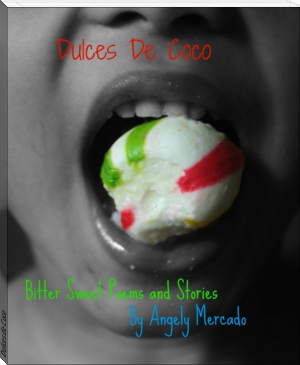Dulces de Coco - Angely Mercado (books like harry potter TXT) 📗

- Author: Angely Mercado
Book online «Dulces de Coco - Angely Mercado (books like harry potter TXT) 📗». Author Angely Mercado
So to preserve what his child-like mind understood as dignity, my father would sit at the very last row of his classroom. He wouldn’t raise his hand and he didn’t receive any extra credit. My father went on to explain that his shoes had always been an issue for him when growing up. On top of being the middle child and having to wear worn out, hand me down clothing, my father had to put up with all the town kids hurling the word jibaro at him. Though that word technically means “forest person” or “hill farmer/peasant” and is also found in indgenous dialect, over the years, people had manipulated it. And instead of saying the word, certain individuals began to spit it out as an insult. Pronouncing it as if it meant ignorant and dirty, instead of hardworking and humble.
“Whenever a class mate would call me or my siblings a jibaro, we’d end up fighting after class or during lunch,” my father laughed, “but now I like to joke around that I’m a jibarito stuck in New York.”
As my father recalled his worn out shoe days with my mother’s friend, some of my father’s quirks began to make sense. Growing up, my father was always shocked when ever we would all go shopping and I refused his offer of buying new shoes or a new sweater. Whenever I felt that I needed that particular article of clothing, I would ask for it, but I avoided asking too many times.
Another strange habit that came to light was my father’s excessive purchases right before he went to visit family in Puerto Rico. Even though he still had plenty of clothing that were practically new, my father would go shopping and buy several new outfits for his trip. It was as if he had a phobia of repeating an ensemble from one of his previous visits to his home town. That habit infuriated my mother. She would look at his receipts and show them to me.
“Look at this one, over a hundred dollars in shirts, pants and shoes,” she would grumble, “honestly; does he think that his relatives are going to shun him if he wears the same pants twice?”
After the conversation about his muddy shoes, I understood that my father had long rejected the idea of having to wear hand-me-downs and being made to feel insignificant due to the condition of his clothing. I remember all the arguments he had with my mother whenever she made my brother wear someone else's worn out sneakers.
“Don't I work hard so that he can get new shoes?”, my father had exclaimed ,“I’ll just buy him new ones; it’s not that big of a deal to pay for shoes.”
As I sat on the counter listening to my father’s conversation, I looked down at my worn out moccasins. I’ve had them for a few months now and since I walk just about everywhere, they look as if I’ve owned them for years. One of the seams is splitting, the bottoms are a bit worn out and the color of the leather is fading slightly. But I think I’ll keep them for a little bit longer. After all, I’m a farmer’s kid. Ojos
Ojos
Cuando cierras los ojos
Te ves lindo, y tranquillo.
Como un gato que no quiere casar.
Pero quizás
Te ves raro,
Y te debo describirte como
Un niño sonámbulo
Que suena con volar
Y despierta enzima de
Una mesa redonda.
No hay remedio
Que esperar que te despiertes
Y me digas algo chistoso.
Porque cuando cierras los ojos
Pienso que tu estas
Muy
Lejos de mí.
Prefiero que me mires
Y te ríes de mi cabello
Despeinado.
No estoy acostumbrada a nuestra
Unión
Pero ya basta de
Una eternidad de soledad.
Abre tus ojos.
When you close your eyes
Eyes
You look lovely and calm
Like a cat that refuses to hunt.
But maybe,
You look strange
And I should describe you
As a sleepwalking child
Who dreams of flying
And wakes up on top
Of a round table.
And I can’t do much else
But wait for you to wake up
And tell me something funny.
Because when you close your eyes
I feel as if you are
Very
Far away from me
I would rather you open your eyes
And laugh at my messy
Hair.
I’m not accustomed to our
Union
But I’ve had enough of
An eternity of loneliness.
Open your eyes.
Ever since I could remember, my mother’s mother, whom we all called mama Susa, would talk to me about Trujillo. As a child he was just a name and the reason behind everyone’s troubles. By middle school, it registered that he was once the dictator of the Dominican Republic. Stories like “How the Garcia Girl’s lost their Accents” and “In the Time of the Butterflies” made it clear that he had made the lives of many Dominicans difficult, and for those that he disliked the most, impossible.
“He didn't like the Fiallos, so it’s lucky your grandfather wasn't a target,” my grandmother always reminded me “the Fiallos were political and some of them were educated.”
Since my grandfather was the bastard child between a poor country woman and a wealthy architect, he wasn't exactly qualified to be on the dictator’s radar all the time. But that’s a more complicated story.
“Being a woman was difficult during that time,” she told me “my mother was afraid of sending my sister or me into town for too long.”
“Why?”
“Because the dictator and his soldiers made the rules, if they wanted to take someone’s daughter or sister, they could. Everyone was too afraid to tell them no.”
The fact shocked me. But then again, she had first told me this in middle school. That was back when I teachers and textbooks were obligated to tell me that I lived in a utopian state of equality. Women were supposedly able to play on the same field as men. And according to my grandmother who grew up with a 3rd grade education and still held a mentality were men had to be in leadership, women had progressed. I liked to remind her that we still had a few more barriers. I also reminded her that I would try my best to break past a few of them.
“Did they ever try to take you?” I asked.
“No, thankfully I was married early, so that helped.”
I have never liked the idea of an early marriage. So it didn't really register why it would be beneficial to her. But my grandmother saw my raised eyebrow and understood.
“If you were married, then they couldn't really take you away.”
“Did they ever try to?”
“There was this one time that a solder approached me,” she began.
That instantly perked my interest.
“Did he try to drag you off like in those old movies were the woman screams but doesn't fight back?”
I was really hoping that it wasn't the case. My grandmother was probably the type to fight back, but then again, she freaked out over barking Chihuahuas and the sound of plates falling.
“No, he didn't drag me off you dummy. He just saw me standing alone one day and came over.”
“Where were you?” I asked.
“Masimo and I were just out at a dance or something one night and he went to go speak to someone. And the soldier just came and asked where my husband was so I pointed him out.”
“Did he keep asking you for more information, like were you lived?” I pressed on.
“Na, he just left me alone after that.”
“Oh.”
I wanted to hear about a love triangle, or a bar fight between my grandfather and a soldier.
“So I guess no one had to really fight for your honor then.”
My grandmother just laughed and began to talk about other family stories.
I tried to imagine a soldier, hair combed back, his uniform pressed in a way that only a non electric iron could. Sun dusked cheekbones from standing at attention in the Caribbean sun before a demanding leader. Burning their skin for El Jefe. Swallowing their rum shots after sundown in the middle of a dingy side of the road bar, the kinds I curled my lips at whenever I had seen them in the Dominican Republic. It must have been worst back during El Jefe’s reign. Before proper plumbing and electricity, but then again, you can’t say that my mother’s country has proper plumbing today. Two weeks of no water one summer, two days of on and off electricity, but flourishing tourist centers. How ironic.
I suppose I should be grateful that El Jefe himself didn't spot mama Susa. Her long, dark, thick, black hair would have drawn him in. From all the books that I read, I realized that the dictator liked women with “white” features, such as straight hair, which is rare in some women in the central part of the country. The older he became, the younger he wanted his women. By the late 50’s, Trujillo was practically babysitting teenage girlfriends. Plus he liked women from the region of El Cibao, coincidentally the region were my mother’s hometown is. Both my grandparents were also born and raised in el Cibao. My grandmother would have been the ideal candidate. Thank God for my grandfather proposing marriage at an early age. Had something gone wrong, I wouldn't have been here. And had my grandmother lived longer, I would have had so many more stories to tell.
dedicated to Jesusita Fiallo Leonardo





Comments (0)